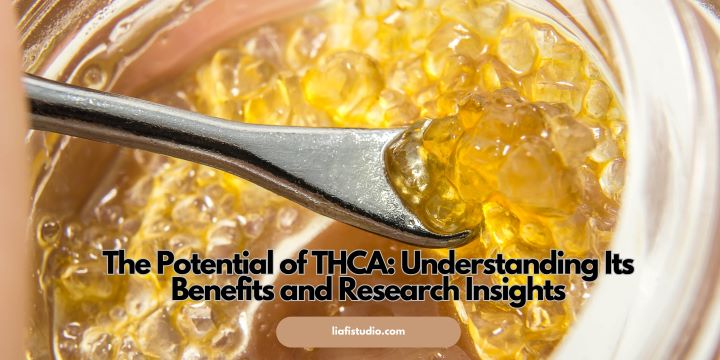Key Takeaways:
- THCA is a non-psychoactive cannabinoid precursor to THC found in cannabis.
- Potential health benefits of THCA include analgesic, anti-inflammatory, and neuroprotective properties.
- While promising, current scientific research requires further studies to understand THCA’s benefits fully.
- Legal and industry standards are evolving to ensure safe consumption of THCA as more discoveries emerge.
Table of Contents:
- Introduction
- What Is THCA and How Does It Differ from THC?
- Potential Health Benefits of THCA
- THCA in Holistic Medicine
- Comparing THCA with Other Cannabinoids
- THCA and Lifestyle: Who Can Benefit?
- Legal Perspectives and Industry Standards Around THCA
- Conclusion
Introduction
The discovery of cannabinoids and their potential influence on health has led to a significant surge of interest within scientific and consumer circles alike. Each cannabinoid, including the lesser-known THCA, brings its unique properties to the table, not only in the context of its biological effects but also regarding its legal status, cultural impact, and therapeutic potential. Particularly, THCA, which remains non-psychoactive, has piqued the curiosity of researchers and wellness enthusiasts for its promise without the high associated with cannabis use.
As this article peels back the layers of misconception and brings to light the multifaceted nature of THCA, it aligns with a commitment to delivering content rooted in facts and empirical evidence. This exploration will take you through the scientific backbone detailing the uses and benefits of THCA, its comparison to other cannabinoids, and how it’s reshaping conversations in health and lifestyle sectors worldwide.
What Is THCA and How Does It Differ from THC?
Understanding the distinction between THCA and THC is instrumental in comprehending the broader canvas of cannabis research. THCA is a cannabinoid that serves as a precursor to THC, which is well-known for its psychoactive properties. Found abundantly in fresh hemp plants, THCA undergoes the process of decarboxylation, where it loses a carboxyl group through exposure to heat, drying, and curing, ultimately converting into its psychoactive relative, THC. This transformation is crucial, as it signifies the difference between a compound that can alter cognitive function (THC) and one that does not affect such capabilities (THCA).
Legally, the distinction holds considerable weight as well. Although many regions have strict rules regarding THC owing to its psychoactive effects, THCA often falls into a gray area given its non-intoxicating nature. Understanding the legal nuances is essential for consumers and professionals navigating the cannabis industry landscape, especially when considering the use of cannabinoids for health and wellness purposes.
Potential Health Benefits of THCA
The sphere of cannabinoid research is abuzz with the potential health benefits of THCA. Preliminary studies hint at its role as an analgesic, potentially offering pain relief for chronic conditions without the side effects associated with conventional painkillers. Its anti-inflammatory properties are also of great interest, suggesting it could mitigate the symptoms of inflammation-related ailments such as arthritis or Crohn’s disease. Moreover, the neuroprotective aspects under investigation could pave new avenues for supporting brain health, focusing on neurodegenerative conditions.
Looking beyond these specific advantages, the general wellness benefits of THCA also capture attention. These benefits are appealing because of their breadth and the promise of achieving them without experiencing psychoactive effects, making THCA a compelling topic in the dialogue on natural health supplements.
THCA in Holistic Medicine
Integrative and holistic approaches to health have always emphasized balance, synergy, and the utilization of natural compounds for healing. In this context, THCA is becoming a buzzword among practitioners eyeing its integration into regimens that prioritize wellness from a multi-dimensional perspective. Although individual experiences with THCA are backed chiefly by anecdotal evidence, the narratives offer a glimpse into its potential role in enhancing quality of life.
For instance, some individuals report experiencing improved digestive function or a sense of well-being and relief from specific symptoms when incorporating THCA into their holistic practices. These accounts, although not substitutes for scientific evidence, provide a foundation for further inquiry and serve to inform controlled studies in the future.
Comparing THCA with Other Cannabinoids
Comparative analyses are crucial for distinguishing the specific benefits and applications of various cannabinoids. Like THC and CBD, THCA interacts with the body’s endocannabinoid system but with its unique signaling, suggesting potential differentiation in its therapeutic effects. Such comparisons not only help to clarify the roles of individual cannabinoids but also shed light on their potential synergistic relationships—often referred to as the entourage effect—wherein the combined effect of cannabis’s various compounds may be greater than the sum of their individual effects.
THCA and Lifestyle: Who Can Benefit?
Although research is ongoing, the current understanding of THCA’s properties indicates that many individuals could benefit from its incorporation into their lifestyle. From the athlete seeking muscle recovery to the senior looking for natural relief from joint pain, THCA’s purported health benefits may cross demographic barriers. This inclusivity, however, must be tempered with personalized approaches to its use, considering factors such as appropriate dosages, methods of ingestion, and the source and quality of THCA products.
Legal Perspectives and Industry Standards Around THCA
As the perceptions of cannabis and its compounds continue to shift, regulatory frameworks are being reevaluated and updated. For THCA, this legal reconsideration parallels a burgeoning industry that considers quality and safety paramount. The emergence of testing protocols and manufacturing standards responds to the demand for effective and reliable products. Moreover, these measures enable a clear understanding of what consumers are ingesting or applying, fostering an environment of trust and informed choice in a still-developing market.
Conclusion
This exploration of THCA has traversed through the scientific terrain, evaluated its health prospects, and clarified misconceptions, positioning THCA as a distinct and promising cannabinoid within the vast cannabis spectrum. It underscores the need for a progressive outlook that embraces evidence-based considerations, ongoing research, and open dialogue about the future of THCA in enhancing the human experience. The continued evolution of our understanding will undoubtedly reveal new layers of potential for THCA, solidifying its role in the broader narrative of wellness and natural therapies.








